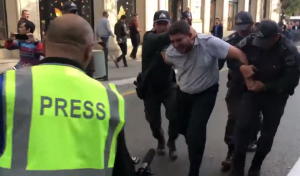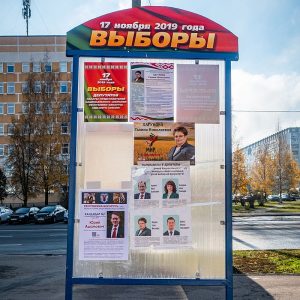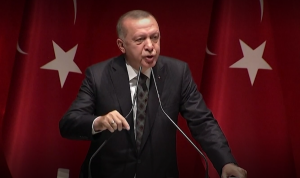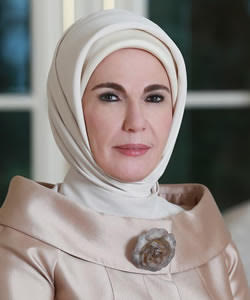Russia: Press freedom violations October 2019
[vc_row][vc_column][vc_column_text]
Index on Censorship’s Monitoring and Advocating for Media Freedom project tracks press freedom violations in five countries: Azerbaijan, Belarus, Russia, Turkey and Ukraine. Learn more.
[/vc_column_text][vc_custom_heading text=”21 Incidents” use_theme_fonts=”yes”][/vc_column][/vc_row][vc_row][vc_column][vc_column_text]
State-run Channel One cut out blogger’s joke about police

Ivan Urgant’s evening talk show edited out a joke about the police by blogger Danila Poperechny.
29 October – YouTube blogger Danila Poperechny said that his joke about the police was edited out of an episode of the late-night show Vecherny Urgant (Evening Urgant) at the state-owned Channel One.
After public outcry, the presenter Ivan Urgant showed the deleted joke in the next episode of the program. Poperechny’s joke alluded to the police raids carried out at the concerts of independent artists considered disloyal to the ruling government, and the fact that such artists would rarely appear on state-owned television stations.
Links:
https://twitter.com/Spoontamer/status/1188921512528613376
Categories: Censorship
Source(s) of violation: Government/State Agency/Public official(s)/Political party
Bookstore chain refused to sell an issue of Diletant history magazine dedicated to Molotov-Ribbentrop pact
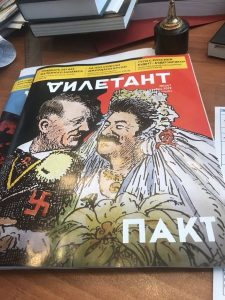
The Diletant history magazine that a bookstore chain refused to sell because it covered the Molotov-Ribbentrop pact. Credit: Alexey Venediktov via Twitter.
28 October – Bookstore chain Molodaya Gvardia refused to sell an issue of the Diletant history magazine dedicated to the Treaty of Non-aggression between Germany and the Union of Soviet Socialist Republics, known as the Molotov-Ribbentrop pact. Alexey Venediktov, editor-in-chief of Ekho Moskvy radio station, which supports the publication of the magazine, wrote about Molodaya Gvardia’s stance on Twitter.
The bookstore’s press office told Znak.com that they were concerned about potential problems with the authorities related to the article 20.3 of the Administrative code, which bans the reproduction of Nazi symbols. The cover of the magazine is a reproduction of a 1939 American caricature depicting Adolf Hitler and Josef Stalin as a bride and groom.
Vitaly Dymarskiy, editor-in-chief of Diletant magazine, told Telegram channel Rasstriga that he interpreted the bookstore’s decision to be an act of self-censorship.
Gennady Zyuganov, leader of the Russian Communist party, claimed that he would sue the magazine and would file a complaint to Roskomnadzor. He reportedly told the Telegram channel Podyem that the prosecutor should investigate and put those responsible in jail.
On 28 October, the State Historical Museum cancelled the monthly lecture organized by Diletant magazine, citing disagreement with the views expressed in the last edition. The museum’s press service reportedly told Interfax news agency that it was a “principled position” on the part of the museum’s management, after they became aware of the magazine’s content.
Links:
https://twitter.com/aavst/status/1187302972876832768/photo/1
https://www.bbc.com/russian/news-50213831
Categories: Censorship
Source(s) of violation: Government/State Agency/Public official(s)/Political party
CEO of Karelia firm sued local journalist over article about his bonus
25 October – Pavel Degtyarev, CEO of Karellesprom, filed a million rubles ($15,630) defamation lawsuit against Svetlana Lysenko, a journalist with the local website Vesti Karelii, Stolicaonego.ru reported. The Karelia republic is a majority shareholder of Karellesprom.
Degtyarev claimed that Lysenko’s July article entitled “Spoon of tar in a barrel of forest honey: why did the director of Karellesprom receive a 26 million ruble ($406,383) bonus?” damaged his professional reputation. Degtyarev didn’t deny receiving the bonus.
In the article, Lysenko questioned the ethics of the bonus, arguing that Republic of Karelia is not wealthy enough to grant such premiums to management.
Links:
https://vestikarelii.ru/kapit/lozhka_degtja_v_bochke_lesnogo_meda/
Categories: Subpoena / Court Order/ Lawsuits
Source(s) of violation: Known private individual(s)
Yekaterinburg journalist accused of insulting authorities
21 October – Yekaterinburg-based journalist and political analyst Fedor Krasheninnikov was accused of insulting the authorities, Meduza reported.
On 21 October, policemen went to Krasheninnikov’s home to officially summon him to the police department. When the journalist arrived at the local police department with his lawyer, they were told that somebody named Salavat Khaziev had filed a complaint against Krasheninnikov for insulting the authorities on his Telegram channel. In it, Krasheninnikov allegedly criticized the prolongation of the arrest of Leonid Volkov, former head of the campaign for opposition politician Alexey Navalny, and called the judges who sentenced him prostitutes.
The journalist denied any wrongdoing. He said that he didn’t know the identity of the person who filed the complaint against him. Krasheninnikov reportedly told Meduza that he attributed the origin of the case to local authorities’ “unhealthy concerns” about him. According to Meduza, he said that the authorities constantly call him names and scold him in pro-government anonymous blogs. In his commentary to Kommersant, he said that his comments about Volkov were private and emotive.
According to reports, a court will determine the future of the complaint.
Links:
https://www.kommersant.ru/doc/4141118
Categories: Subpoena / Court Order/ Lawsuits, Criminal Charges/Fines/Sentences
Source(s) of violation: Police/State security, Known private individual(s)
Court refused to force Roskomnadzor to register opposition politician’s media outlet
24 October – Ostankinsky District Court refused to force Roskomnadzor (the Russian state media regulator) to register a media outlet founded by opposition politician Dimitry Gudkov.
Its editor-in-chief Alexey Obukhov filed a complaint to the court after the registration of his media outlet was refused numerous times. Obukhov said that among Roskomnadzor’s reasons were that he didn’t bring proof that he didn’t have a second citizenship and that he didn’t indicate the zip code in one of the documents. During the hearing, a Roskomnadzor representative said that Obukhov didn’t prove that he hadn’t been previously incarcerated.
Obukhov said that he had brought all the documents previously requested by Roskomnadzor to the court. The judge suggested that he re-apply for registration. Obukhov has been trying to register Gazeta Gudkova newspaper as an official media outlet since March 2019.
Links:
Categories: Legal Measures
Source(s) of violation: Government/State Agency/Public official(s)/Political party, Court/Judicial
Grani.ru reporter assaulted while working on a story about a housing scheme
24 October – Andrey Novichkov, reporter with independent media outlet Grani.ru, was assaulted by two unknown men while working on a story about a state-funded housing scheme, Mediazona reported.
Novichkov was accompanying the deputy of the Moscow city parliament Elena Shuvalova, who came to inspect one of the houses, which were built for those eligible for free housing (families with more than 3 children, disabled people, military personnel, orphans, etc.). According to the investigation of the Anti-Corruption Foundation, however, the apartments in the house were given to dozens of Moscow officials and supporters of the city’s mayor, Sergey Sobyanin.
When the deputy and the journalist entered the house and took photos, four men came out of an apartment, which reportedly belongs to the deputy head of Moscow city parliament Olga Timofeeva, and assaulted the journalist. They tried to push him inside the apartment, threatening to break his tablet and lock him inside. Mediazona published a video of the assault. When Shuvalova went to call the police, the assailants released the journalist.
Links:
https://tvrain.ru/news/na_deputata_mosgordumy_i_zhurnalista-496084/
https://www.facebook.com/elenashuvalova.ru/posts/1163759710481949
Category: Physical Assault/Injury, Intimidation
Source(s) of violation: Unknown
Editor-in-chief of NewsVo.ru fined twice for alleged ‘obscene’ language in the blog section of the site
23 October – Evgeniya Sibirtseva, editor-in-chief of Vologda local media outlet NewsVo.ru was fined 5,000 rubles ($78) for alleged ‘obscene’ language in a reader’s blog of the news website, 7×7 reported. The journalist reportedly said that she was never notified about the hearing, and found out about the court’s decision post-factum via a text message from her bank, which informed her that a fine had been withdrawn. Sibirtseva said that she was charged the same fine twice – from two different bank accounts. She was told that the second charge would be returned to her account.
She told 7×7 that in 2019 NewsVo.ru was fined for obscene language in the blogs section of the website three times. “It’s just an excuse to fine the media and fill the officials’ pockets,” Sibirtseva said in a statement at NewsVo.ru.
Links:
https://newsvo.ru/blogovo/123118
https://lenizdat.ru/articles/1156425/
Category: Criminal Charges/Fines/Sentences
Source(s) of violation: Government/State Agency/Public official(s)/Political party
Rossiya channel withdraws episode of a show covering the collapse of a dam at Krasnoyarsk gold mine

State-owned Rossiya channel withdrew an episode of Pryamoy Efir, which covered the story of a dam that collapsed in a gold mine in the Krasnoyarsk region.
23 October – State-owned Rossiya channel withdrew an episode of the talk show Pryamoy Efir, after it had been shown live and in full to viewers in Siberia and the far eastern regions of Russia, Krasnoyarsk outlet NGS24.RU reported. The episode covered the story of a dam that collapsed in a gold mine in the Krasnoyarsk region (Siberia) in October and caused the deaths of at least 15 people.
Live shows on Russian television are broadcast in the furthermost eastern time zone first, and then replayed in the same time slot in more time zones that are further west. The episode of Pryamoy Efir, which is hosted by the prominent TV presenter Andrey Malakhov, was withdrawn and not shown in the more westerly time zones. It was replaced with another episode of Pryamoy Efir.
A reporter from NGS24.RU took part in the show. The outlet reported that the episode was removed because of a call Rossiya received from the authorities. NGS24.RU published a fragment of the deleted show, in which Malakhov was reading out the results of an express test of the water probe from Seiba river, where the dam collapsed, indicating highly abnormal presence of chemicals, including mercury. Ecologists who took part in the show reportedly suggested that this may have been caused by the use of outdated technologies in the gold mine and that the chemical leaks could seriously threaten the ecology of the Krasnoyarsk region.
The Rossiya press office said that the Pryamoy Efir episode was only ever intended for broadcast in the far eastern regions.
Links:
https://www.bbc.com/russian/news-50157041
https://www.bbc.co.uk/news/world-europe-50108413
Category: Censorship
Source(s) of violation:
Journalist detained in Krasnodar region
22 October – Gleb Pyanykh, former NTV journalist and TV presenter who is currently running his own YouTube channel with reports on politics and the economy, was detained in the Krasnodar region, RBC reported.
Pyanykh went to Dinskaya village to work on a story about a villa that was illegally built on agricultural lands, which allegedly belongs to the governor of the Krasnodar region, Veniamin Kondratyev. The journalist was stopped near the villa by a uniformed security guard, who questioned Pyanykh about his work and demanded that he go to the security office. At the same time, another man in plain clothes arrived in a car and blocked the way out. When Pyanykh started to film what was going on with his mobile phone, the men let him drive away.
However, after 500 meters the journalist’s car was stopped by police. They said that they received a call from the villa’s security guards and demanded that the journalist write an explanatory note about his activities. The policemen detained Pyanykh for about an hour and then released him without charge.
Links:
https://www.youtube.com/watch?v=P_5tjz9KHCI
Category: Arrest/Detention/Interrogation, Blocked Access
Source(s) of violation: Police/State security, Private security
Novaya Gazeta reporters assaulted at hunting centre in Moscow region
19 October – Svetlana Vidanova and Artyom Raspopov, correspondents with independent newspaper Novaya Gazeta, were assaulted while working on a story about the illegal training of hunting dogs, Novaya Gazeta reported. Wild animals in Solnechnogorsk district of Moscow region were reportedly being hunted and killed during the trainings.
The journalists were accompanying animal rights activists when they were inspecting the area around the illegal training centre and found two fox skulls and a dead dog. When they entered the centre’s premises, the security guards approached Vidanova, twisted her arms, punched the camera and took her press card. The guards also took away Raspopov’s mobile phone and threw it over the fence, twisted his arms and pushed him out of the centre’s gate.
Police were called to the scene, but did not interfere while the assault was ongoing. The journalists received medical attention and filed a police report.
Links:
https://www.facebook.com/novgaz/photos/a.136917239684305/3217048941671104/?type=3&theater
Category: Physical Assault/Injury
Source(s) of violation: Private security
Roskomnadzor banned a report about a nationalist rally published 6 years ago
17 October – Russian state media regulator Roskomnadzor notified Tayga.info about the inclusion of their article about a 2013 nationalist rally in Novosibirsk in the list of banned materials, Tayga.info reported.
The article entitled “Novosibirsk divided into two Russian rallies” was published on 4 November 2013. Explaining the ban, Roskomandzor cited a Yekaterinburg court’s decision from 5 April 2018, which ruled that the article contained an extremist slogan. However, the slogan in question was deemed to be extremist by the court only in 2017, four years after the publication. The 2018 trial was initiated by the local prosecutor’s office. Tayga.info was never notified about the hearing before receiving Roskomnadzor message on 17 October 2019.
Tayga.info’s editors removed the rally slogan from the article, along with two photographs where it’s visible. They are consulting lawyers about the matter. In a statement, the website’s editorial team said that they didn’t consider the post-factum removal of information, which at the time of publication was not banned, to be legal.
Links:
https://tayga.info/149498?fbclid=IwAR16jH060QEZvJmQD45e9aSR1wwYCO_tGszBD1k_5FehW-o1SPUG3UMcwmU
Category: Legal Measures
Source(s) of violation: Government/State Agency/Public official(s)/Political party
13 Yekaterinburg journalists barred from covering trial on murder of local woman
17 October – Lenisnky district court of Yekaterinburg approved an appeal filed by prosecutors and supported by defense to close the trial on the murder of a local woman, Ksenia Katorgina, to the press and the public, MK-Yekaterinburg reported.
The journalists were removed from the courtroom. They were also prevented from filming the three suspects in the court’s halls, and were told not to film them through the windows when they were brought to the court.
Links:
https://www.e1.ru/news/spool/news_id-66273460.html
https://74.ru/text/criminal/66273460/
Category: Blocked Access
Source(s) of violation: Court/Judicial
Journalist of Samarskaya Gazeta forced to quit after publicly revealing city mayor’s efforts to censor the newspaper
17 October – Maxim Melnikov, journalist with Samara newspaper Samarskaya Gazeta, was forced to quit his job after publicly criticizing the editorial standards of the newspaper, which he said bowed to pressure imposed by officials from Samara’s mayor’s office.
On 10 October, a video from a local journalism conference was published with a 10-minute speech from Melnikov, in which he said that he published an ironic post on Samarskaya Gazeta’s official Vkontakte account about a street that was flooded due to a burst pipe.
Within 30 minutes of Melnikov having posted the comment, Samarskaya Gazeta’s editor-in-chief reportedly received a call from the city mayor’s office demanding that the post be deleted. According to Melnikov, that the editor and the unnamed official negotiated a deal that the outlet would keep the post, but publish only positive news about the incident in the following two or three days.
After the video of his conference speech was published, he was asked by the newspaper’s management to resign. The journalist reportedly expressed frustration that the authorities censor people who speak about problems, rather than trying to solve them.
Links:
https://www.facebook.com/story.php?story_fbid=2710398908992030&id=100000658419213&sfnsn=mo
Category: Censorship
Source(s) of violation: Employer/Publisher/Colleague(s)
Police searched the homes of journalists in relation to Anti-Corruption Foundation case
15 October – Police searched the homes of four journalists in different Russian regions, as part of a money-laundering probe into opposition politician Alexei Navalny’s Anti-Corruption Foundation, reported multiple outlets.
In the early hours of 15 October, police raided the home of Alexey Seregin, a Mari El-based journalist working for Idel.Realii. He told Idel.Realii that the police conducted a 3-hour search of his home and seized his personal belongings, including a computer, a mobile phone and a recorder. Seregin said that he had covered Navalny’s activities in the Mari El region, but had never worked with the politician’s Anti-Corruption Foundation.
A second Idel.Realii journalist, Dmitry Lubimov, wrote in a Facebook post that police carried out a simultaneous raid of his Yoshkar-Ola apartment, where he has not lived since February. Lubimov believed it was an attempt to put pressure on him and prevent him from his carrying out his work, which included covering Navalny’s activities.
A simultaneous raid was also carried out at the Smolensk home of Alexey Volkov, editor-in-chief of local website Keytown.me. Keytown.me had published news articles about the activities of the local office of Navalny’s political movement. Police told Volkov that the search would be conducted in connection with the money laundering case against the Anti-Corruption Foundation. When Volkov asked how he was connected to the money laundering investigation against the Anti-Corruption Foundation, police said: “This is what we will find out”. The search lasted two hours, during which the police threatened Volkov’s wife that they’d take away their two children, including their 4-month-old baby, if she didn’t sign a non-disclosure agreement. The police seized the journalist’s personal belongings, among them two computers, a hard drive, a mobile phone and all bank cards, even the one that was used for receiving children’s welfare. After the raid, the journalist was reportedly questioned for an hour by the investigator of the Investigative Committee of Smolensk region. Volkov subsequently told 7×7 that he had nothing to do either with the Anti-Corruption Foundation or with the local office of Navalny’s movement, and only covered them in the news.
On the same day in Vladimir, the police searched the editorial office of local press club Dovod. Its journalists were questioned over the case against the Anti-Corruption Foundation. The police seized laptops and computers, and the smartphone of the editor-in-chief, Kirill Ishutin.
On 16 October, police searched the home of Arkhangelsk-based journalist Yaroslav Varenik, seizing the hard disk of his computer, his notebook and his phone, 29.Ru reported. Varenik was taken to the police department for questioning and then released the same day.
In the days that followed, police searched the Moscow headquarters of the Anti-Corruption Foundation and the homes of the employees of its 30 regional offices.
Links:
https://www.facebook.com/lemuyel/posts/2494914360562191?__tn__=H-R
https://29.ru/text/politics/66272740/
https://www.dovod.online/v-redakcii-dovod-prohodit-obysk/
Category: Arrest/Detention/Interrogation
Source(s) of violation: Police/State security
Proekt journalists received threats after publishing story on Russian mercenaries in Libya
15 October – Roman Badanin, the founder and editor-in-chief of investigative media outlet Proekt, told Reuters about the surveillance, hacking attacks, and threats that Proekt journalists have been subjected to following the publication of a story about Russian mercenaries in the Libyan Civil War earlier this year.
According to Badanin, the journalists who worked on that investigation received explicit threats of physical violence via email. He said that attempts to hack the journalists’ accounts on Facebook, Telegram and Gmail were also made. Badanin referred to an incident in which Maria Karpenko, a Proekt reporter based in Saint Petersburg, was followed by an unidentified man who was filming her. Badanin said he believed that it was useless to report the threats to the police, and that he believed that publicity might be a better way to protect the journalists.
Since March Proekt has published reports on the activities of a Russian mercenary group known as CHVK Vagnera and linked to Saint Petersburg businessman Evgeny Prigozhin. The press service of his firm Konkord Management & Consulting refused to give a comment to Reuters.
Links:
https://www.proekt.media/investigation/prigozhin-libya/
ttps://ru.reuters.com/article/topNews/idRUKBN1WU252-ORUTP
Category: Intimidation, DDoS/Hacking/Doxing
Source(s) of violation: Corporation/Company, Known private individual(s), Unknown
Yaroslavl journalist’s car burnt out
13 October – On the night of 12 October, the car of Marina Borbat was set on fire and burnt out, Regnum news agency reported. Borbat is the director of Yaroslavl regional broadcaster DIA-TV. Borbat believes the arson could be related to a previous conflict with a local crime boss.
According to Igor Yamshikov of the All-Russia People’s Front movement, posting on the Yaroslavl branch’s Facebook page, said they believe that the arson attack was linked to Borbat’s journalistic activities.
According to Yamshikov, Borbat had a run-in with a crime boss, after her filming equipment went missing while she was covering a story on 26 September 2017. Borbat reportedly filed a complaint to the police, and a similar complaint was filed by the editor of Severyanka local newspaper, but the police did not find any wrongdoing on the part of the crime boss.
In a separate case, the crime boss was reportedly found guilty of hooliganism and sent to prison. He is due to be released shortly. Borbat said that while she had no evidence that the damage of her car was linked to the crime boss, she knew that several people who had conflicts with him had their cars burnt out.
Links:
https://regnum.ru/news/accidents/2748889
Category: Intimidation/Attack to Property
Source(s) of violation: Unknown
MBH Media journalist detained in Moscow
7 October – Nikita Maslovsky, a reporter with MBH Media, was detained along with Bessrochny Protest [Eternal Protest] activists while covering their activities in Moscow, MBH Media reported. The activists were planning to stage an anti-Putin protest at Kutuzovsky Prospekt imitating president Putin’s funeral, but were intercepted by the police.
Although Maslovsky was just covering the demonstration, he was also detained by police. He had tried to show police his press identification, but they ignored it. They refused to state the reason for his detention. Maslovsky was taken to a police van, where police tried to confiscate his phone. After more than five hours, the journalist was released without charge.
Links:
https://mbk-news.appspot.com/news/v-moskve-polic/
Category: Arrest/Detention/Interrogation
Source(s) of violation: Police/State security
Editor of Magadan media outlet Vesma assaulted in his house
3 October – Andrey Grishin, chief editor of independent online news agency Vesma, was beaten on the staircase of his apartment building in Magadan, Vesma reported.
Around 10:30 am, a young man knocked on Grishin’s door, saying that he had accidentally crashed into his car in the courtyard and asking the journalist to come down with him. When Grishin came out, there were two other men waiting. They attacked him and after reportedly punching him 15-20 times, one of them said to him: “Do you understand? Don’t write anything like that anymore”. The journalist said he didn’t sustain any serious injuries and that he didn’t know which particular story they were referring to.
Updates:
18 October – Magadan police reportedly detained two male suspects, aged 19 and 27. Both are pleading guilty. The police opened a criminal case against them under article 116 of Russia’s Criminal Code (physical violence).
21 October – Telegram channel Sovest Gubernatorov [Governors’ Conscience] reported, citing the police sources, that the testimonies of the detained suspects were classified, and the case against them was downgraded to an administrative violation due to the possible involvement of a local deputy Eduard Kozlov from the ruling party United Russia. According to the Telegram channel, the suspects mentioned in their testimony that Kozlov was the mastermind of the attack.
Links:
https://www.svoboda.org/a/30207298.html
https://49.xn--b1aew.xn--p1ai/news/item/18646886/
http://vesma.today/news/post/11006-v-telegram-kanalakh-poyavilas-versiya-
Category: Physical Assault/Injury, Intimidation
Source(s) of violation: Unknown, Known Private Individuals
Editors of Pskov outlets summoned for questioning over Prokopeva case
3 October – Maxim Kostikov, editor-in-chief of Ekho Moskvy-Pskov radio station, and Alexander Savenko, editor-in-chief of Pskovskaya Lenta Novostey, were summoned for questioning to the police department over Svetalana Prokopeva’s case, Novaya Gazeta reported.
In September Prokopeva, a radio journalist with Ekho Moskvy, was charged with justifying terrorism over her comments about Arkhangelsk FSB office bombing, which she made on the radio late last year.
Due to a non-disclosure agreements, the editors were not in a position to discuss the nature of the questioning. On 1 October both outlets, along with a dozen other media outlets, published an open letter written by Prokopieva.
Links:
Category: Arrest/Detention/Interrogation
Source(s) of violation: Police/State security
Armed policemen visited office of Chernovik newspaper in Dagestan
2 October – Armed officers of the Dagestan Investigative Committee came to the editorial office of the Makhachkala-based newspaper Chernovik, MBH Media reported. The officers demanded that two offices – those of the editor-in-chief and the paper’s founder – be opened, but because they were at a forum in the city of Perm at the time, the offices remained locked.
The deputy editor-in-chief Magomed Magomedov reportedly said that the Dagestan Investigative Committee’s actions were in the framework of the criminal case against Chernovik journalist, Abdulmumin Gadzhiev, who was detained in June on terrorism charges. On 23 July Gadzhiev was charged under article 205.1 of the Criminal Code (financing terrorism).
Links:
https://mbk-news.appspot.com/news/iloviki/
Category: Legal Measures
Source(s) of violation: Police/State security
Roskomnadzor blocked website of news agency Fergana
1 October – Roskomnadzor, the Russian state media regulator, blocked access to the website of news agency Fergana without any prior notification, Fergana reported.
Maria Dubnova, Fergana’s editor-in-chief, said that the block came as a complete surprise and that they would investigate the situation. She said that Fergana had already sent a request to Roskomnadzor asking to explain why the access to the website was limited without warning.
Fergana has been covering Central Asia since 1998, and is currently banned in Tajikistan.
Update:
8 October – Roskomnadzor unblocked the website of Fergana news agency after they deleted a news story about a Kyrgyz man’s suicide published in February this year. The agency learned that they were prosecuted for that particular story with the help of Roscomsvoboda project, as the regulator never replied to the agency’s inquiries. Roskomnadzor is known to block websites that publish stories on suicide in which the method is mentioned.
Links:
https://fergana.agency/news/111306/
https://www.bbc.com/russian/news-49903556
Category: Legal Measures
Source(s) of violation: Police/State security[/vc_column_text][/vc_column][/vc_row][vc_row][vc_column][vc_basic_grid post_type=”post” max_items=”4″ element_width=”6″ grid_id=”vc_gid:1575023592087-f59638a3-3b6f-7″ taxonomies=”8996″][/vc_column][/vc_row]

